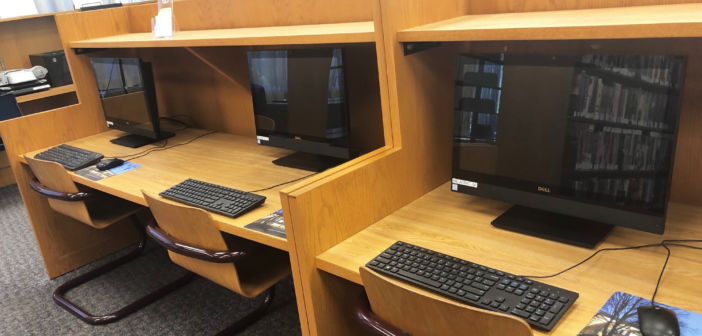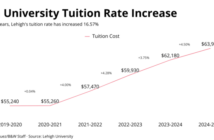Internet usage around the world has increased by 1,066% from the year 2000 to 2018, according to Broadband Search statistics.
This trend and its relevance to digital learning and education is only intensifying and creating more and more of a disparity between those with access to high-speed, reliable internet and those without it.
Students in the Bethlehem Area School District face everyday limitations in receiving appropriate and consistent internet access at home, according to Broughal Middle School Principal Rick Amato. This lack of access for some forms a digital divide and creates constant challenges to the education students receive. To close the gap, leaders of the school district work together to find solutions and provide similar opportunities to all students, whether they have internet access at home or not.
“Access is there if you can afford to buy it,” said Joseph Roy, Bethlehem Area School District superintendent.
He said income level is the main issue within the Bethlehem community.
Amato looks at internet access today similarly to a utility like electric and water, because society is so strongly demanding it everywhere.
“It should no longer be a luxury for people who can afford it, it should be a necessity for everybody,” Amato said.
He said having internet access be unaffordable for some students establishes a large disparity between those who have 24/7 access and those who don’t.
“It’s obvious that the students who can access internet 24/7 get ahead,” Amato said.
Amato said Broughal Middle School and the Bethlehem Area School District generalize student economic status is in part by recognizing those which students receive free and reduced lunches during the school day.
A student has to be living right on the poverty threshold line to receive this assistance.
Broughal Middle School’s free and reduced lunch rate is over 90 percent, compared to a 50 percent average rate throughout the rest of the district.
“When my students leave here and go to Liberty or Freedom High and are mixed with that 50 percent, they actually see (the disparity) more,” Amato said.
He said right now the students at Broughal are all feeling the disparity together, so they notice it less. It’s not part of their world yet.
When Broughal students move on to high school, they’re exposed to other students who have reliable internet access at home and proper devices to use it.
Amato said it hurts them on the education side because teachers perceive them as careless or unprepared, when in reality, they just don’t have the resources to do the work.
“It’s not equitable to say a kid who struggles economically now needs to work harder when something is just given to another child,” Amato said.
The district is working on multiple solutions for next year to remedy this issue and eliminate the disadvantages students without access at home face. Roy said they’re attacking it in three ways.
The first way is by providing hotspots. The district is buying 100 devices for the upcoming school year for students. The Bethlehem Area Public Library provides hotspots as well.
According to the library’s 2018 Annual Report, 572 internet hotspots were borrowed last year.
Bethlehem Area Public Library Director Josh Berk said it’s a challenge, however, because students need access all the time, and hotspots are only available to be checked out for a week at a time.
“We’ve been talking to the school district about ways we can provide take-home internet access to more kids,” Berk said.
The library provides free internet access for anyone in the community who needs it.
“I still think there’s a major gap there between having it always on at home as opposed to someone who has to go back and forth between home, the library and school for access,” Berk said. “We just do our best to support the schools and the kids and make it as available as we can.”
Roy said the next the goal is “community-based access to Wi-Fi.”
Since many students go to youth centers for Wi-Fi access, the district has been going around to community agencies in higher-poverty neighborhoods like the Hispanic Center and Northeast Ministry to see what they have in terms of access and to see if there’s a way students can log directly into the school’s network.
The final and most substantial solution in the school district is the introduction of Chromebooks to students in grades 8 to 10 that can be taken home.
Roy said the affordability of proper devices, such as laptop computers, is even more of an issue than internet access, so providing students with devices could make a huge difference.
Broughal history teacher Brittany Williams said the Chromebooks will push the boundaries of teachers’ ability to teach between 8 a.m. and 3:05 p.m.
Students would continuously have access to what they need while learning how to utilize it.
She said granting students that kind of access at home, not just on their cellphones, would be a really big benefit because sometimes a website online looks much different on a cellphone than it does on a computer. Access also differs on different devices.
Williams said that part of her is excited because the students need to learn this kind of responsibility. However, part of her is nervous given the fact that a lot of students tend to forget bringing even a pencil to class.
Roy said they know there’s already all kinds of gaps because of income differences, and this is just another divide—the digital divide—which can hopefully be resolved in the years to come.






Comment policy
Comments posted to The Brown and White website are reviewed by a moderator before being approved. Incendiary speech or harassing language, including comments targeted at individuals, may be deemed unacceptable and not published. Spam and other soliciting will also be declined.
The Brown and White also reserves the right to not publish entirely anonymous comments.